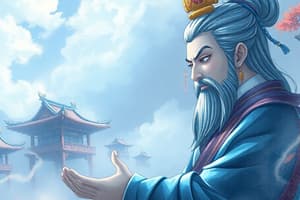Podcast
Questions and Answers
What was Confucius' primary concern in his social hierarchy?
What was Confucius' primary concern in his social hierarchy?
- Democracy and individual freedom
- Clear roles and responsibilities (correct)
- Economic equality and redistribution
- Egalitarianism and social mobility
According to Confucius, what is the primary virtue of a ruler?
According to Confucius, what is the primary virtue of a ruler?
- Wisdom
- Benevolence (correct)
- Justice
- Loyalty
What is the concept of 'Rectification of Names'?
What is the concept of 'Rectification of Names'?
- Ensuring that words and actions match (correct)
- A system of punishment and rewards
- A method of moral education
- A technique of self-reflection
What is the ideal ruler in Confucianism?
What is the ideal ruler in Confucianism?
What is the 'Mandate of Heaven'?
What is the 'Mandate of Heaven'?
What is the primary goal of Confucian education?
What is the primary goal of Confucian education?
What is the importance of the 'Six Arts'?
What is the importance of the 'Six Arts'?
What is the primary emphasis of Confucian self-cultivation?
What is the primary emphasis of Confucian self-cultivation?
What is the significance of the 'Five Relationships'?
What is the significance of the 'Five Relationships'?
What is the Confucian concept of 'Ren'?
What is the Confucian concept of 'Ren'?
Flashcards are hidden until you start studying
Study Notes
Social Hierarchy
- Confucius believed in a hierarchical society with clear roles and responsibilities
- Emphasis on respect for authority and traditional social norms
- The "Five Relationships" (Wuchang):
- Ruler and subject
- Father and son
- Husband and wife
- Older brother and younger brother
- Friend and friend
- Importance of knowing one's place in society and fulfilling one's duties
Moral Values
- Confucius emphasized the importance of personal and governmental morality
- Key virtues:
- Ren (benevolence, kindness, humanity)
- Yi (righteousness, justice)
- Li (etiquette, propriety, good manners)
- Zhong (loyalty, fidelity)
- Xin (integrity, honesty)
- The concept of " Rectification of Names" (zhengming): ensuring that words and actions match
- Importance of self-cultivation and self-reflection
Government and Leadership
- Confucius believed in a government based on moral authority and personal example
- The ideal ruler is a "Junzi" (gentleman, noble): wise, virtuous, and just
- Emphasis on the importance of education and self-cultivation for leaders
- The concept of "Mandate of Heaven" (tianming): the ruler's authority is derived from Heaven
- Importance of fairness, justice, and compassion in governance
Education and Learning
- Confucius believed that education is essential for personal and societal development
- Emphasis on learning through self-study, reflection, and practice
- The importance of the "Six Arts" (liu yi):
- Rites and etiquette
- Music
- Archery
- Chariot-riding
- Calligraphy
- Mathematics
- The concept of "Teaching without words" (wuzi jiao): teaching through example and personal conduct
Personal Development
- Confucius emphasized the importance of personal growth and self-improvement
- The concept of "Cultivating the self" (xiu shen): self-reflection, self-improvement, and self-cultivation
- The importance of setting personal goals and striving for excellence
- The concept of "Knowing oneself" (zhi ji): understanding one's strengths, weaknesses, and limitations
- Emphasis on developing a strong sense of character and moral integrity
Social Hierarchy
- Confucius advocates for a hierarchical society with distinct roles and responsibilities
- Respect for authority and traditional social norms is emphasized
- The "Five Relationships" (Wuchang) define social interactions:
- Ruler and subject requires obedience and loyalty
- Father and son demands respect and care
- Husband and wife expects mutual respect and support
- Older brother and younger brother promotes camaraderie and guidance
- Friend and friend fosters trust and cooperation
- Knowing one's place in society and fulfilling duties is crucial
Moral Values
- Confucius stresses the importance of personal and governmental morality
- Key virtues include:
- Ren (benevolence, kindness, humanity) for empathy and compassion
- Yi (righteousness, justice) for fairness and morality
- Li (etiquette, propriety, good manners) for social decorum
- Zhong (loyalty, fidelity) for commitment and dedication
- Xin (integrity, honesty) for trustworthiness and sincerity
- "Rectification of Names" (zhengming) ensures alignment of words and actions
- Self-cultivation and self-reflection are essential for moral growth
Government and Leadership
- Confucius advocates for a government based on moral authority and personal example
- The ideal ruler (Junzi) is wise, virtuous, and just
- Education and self-cultivation are key for leaders
- The "Mandate of Heaven" (tianming) legitimizes the ruler's authority
- Fairness, justice, and compassion are essential for good governance
Education and Learning
- Confucius emphasizes education's role in personal and societal development
- Learning occurs through self-study, reflection, and practice
- The "Six Arts" (liu yi) are essential skills:
- Rites and etiquette for social propriety
- Music for cultural appreciation
- Archery for physical discipline
- Chariot-riding for physical skill
- Calligraphy for artistic expression
- Mathematics for logical reasoning
- "Teaching without words" (wuzi jiao) emphasizes teaching through example and conduct
Personal Development
- Confucius stresses the importance of personal growth and self-improvement
- "Cultivating the self" (xiu shen) involves self-reflection, self-improvement, and self-cultivation
- Setting personal goals and striving for excellence is crucial
- "Knowing oneself" (zhi ji) involves understanding strengths, weaknesses, and limitations
- Developing a strong sense of character and moral integrity is essential
Studying That Suits You
Use AI to generate personalized quizzes and flashcards to suit your learning preferences.




